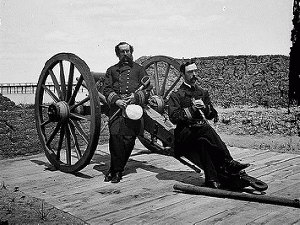Article Series: Traitor to My Race: The Abolition of White Privilege
PART II OF III: JIM CROW RE-VISITED
By the time of Reagan's election in 1980, the liberal state, i.e., a government that saw itself obliged to provide resources to those of its citizens in need, as the Roosevelt governments did during the 1930's and '40's, was largely discredited. Lyndon Johnson, at the behest of his corporate sponsors and the Texas oilmen to whom he was politically beholden, had traded his Great Society and his War on Poverty for the war in Vietnam. The promise of a Second Reconstruction carried to the conclusion that had been abandoned in 1876, that would bring full citizenship to all persons of color in this country, actually to all poor persons, and that was grounded in the bedrock legislation that the Civil Rights movement had obliged Johnson to push through Congress, had once again been abandoned. So, too, was the possibility of putting a halt to America's imperialist wars of aggression, of potential benefit to millions. I believe Martin Luther King was murdered because he had publicly made the connection between white supremacism, Viet Nam and U.S. imperialism in a speech he delivered in the Riverside Church in New York City on April 4, 1967, exactly one year before his death, entitled "Beyond Vietnam: A Time To Break the Silence."
Nixon followed Johnson as President, pitching his appeals to "the silent majority", i.e., a white middle class eager to believe in privileged whites and black bogeymen as the causes of the country's travails; overseeing the "Southern strategy" developed by his campaign consultant Kevin Philips, to induce white Southerners to forsake the Democrats and join the Republican Party; and authorizing the Watergate skullduggery employed by his chief of staff Haldeman to get elected twice. Early in his first term, as Haldeman recorded in a diary entry in 1970 (as published in The NY Times on 5/18/94), Nixon confided to him "that you have to face the fact that the whole problem is really the blacks. The key is to devise a system that recognizes this while not appearing to. Pointed out that there has never in history been an adequate black nation, and they are the only race of which this is true."
While continuing U.S. involvement in Viet Nam until 1972, Nixon launched his misnamed War on Drugs, actually his war on Black American men, whose militancy and opposition to his domestic and foreign policies provoked great fear in him. Since I've written about these events and those that follow below in great detail in a book of essays that will be published some time next month entitled Nation of Killers -- Guns, Violence, White Supremacism: the American Dream Become Delusion (in press), I'll simply summarize what followed.
Michelle Alexander picks up the story in The New Jim Crow " (2012) and tells us how Black men, along with other persons of color, began to be incarcerated at an astounding rate, most for simple drug possession. At the time of her book's publication, one in four Black men was under some form of criminal justice supervision -- approximately four million men, equivalent to the number of Black slaves in this country at the outbreak of the civil war.
Nixon's policy of removing Black men from society has had far-reaching and almost inevitable consequences. By October, 2103, according to the U.S. Bureau of Justice Statistics, the U.S. incarceration rate was the highest in the world, with 716 per 100,000 of the country's residents in jail or prison. Further international comparisons reveal that the United States, which has about 4.4 percent of the world's population, houses around 22 percent of the world's prisoners. In 2007, criminal justice corrections, which includes prisons, jails, probation, and parole, had evolved into an industry with $74 billion in annual revenues.
Most indicative of the marginalization of Black men in America has been the killing of unarmed Black men at the hands of police officers throughout the country, compounded by the failure of local district attorneys, in the great majority of these instances, to issue indictments against the police officers who did the killings. In early August of this year, one year after an unarmed Michael Brown was shot to death in Ferguson by a Ferguson police officer against whom no charges were brought, The Washington Post reported that "So far this year, twenty-four unarmed black men have been shot and killed by police -- one every nine days" (August 8, 2105). Mainstream and conservative commentators waxed ambiguous as the individual killings mounted, flipping between blaming the victim and holding the police and criminal justice system accountable. So did most white folks.
Charleston appeared to tip the balance and bring about a crisis of conscience for most Americans. First, it was shocking to contemplate a lone white supremacist gunman walking into a prayer meeting at an historic Black church in the heart of Charleston, calmly sitting there after being warmly welcomed, and then shooting and killing the nine Black congregants present, including their Black pastor, a member of the South Carolina state legislature. Even more astounding for Americans, whose response is such circumstances is usually vengeful, were the statements of forgiveness for the gunman by the family members of those whom he had killed. The response was immediate and supportive: the Confederate battle flag, a symbol of resistance and pride for most white Southerners and of slavery and brutality for Black and progressive Americans, was finally removed from the grounds of South Carolina's capitol building. Rallies and prayer meetings of support and consolation were conducted across the nation. A consensus appeared to be emerging that racism and unfetttered hatred of Black Americans were at the root of the Charleston and even the police shootings.
(Note: You can view every article as one long page if you sign up as an Advocate Member, or higher).





